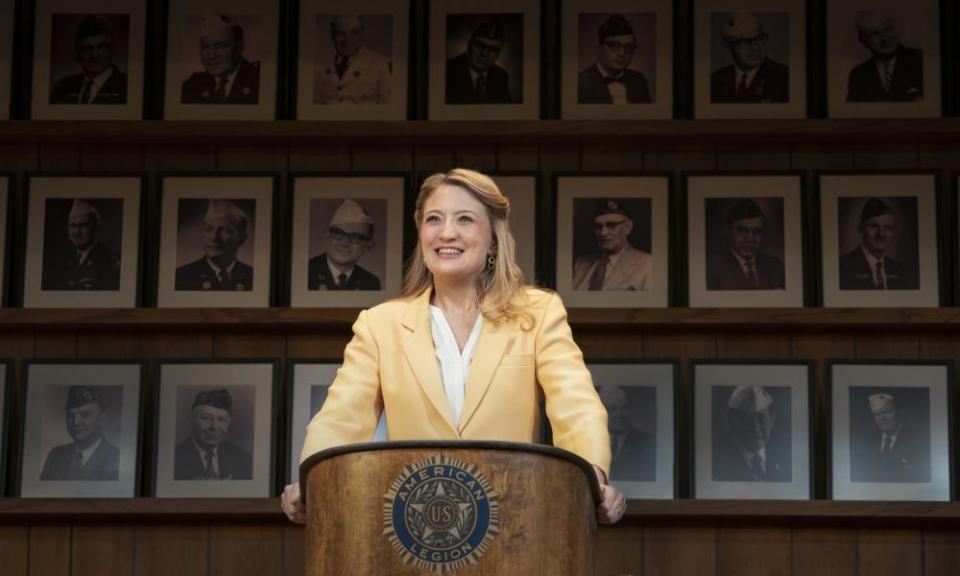A dazzling, shocking indictment of America: What the Constitution Means to Me review

Heidi Schreck tells us she first performed this show a decade ago to about 20 people, mostly friends, and has since rolled it out during presidential elections, supreme court hearings, marches and protests. “Every time I walk out,” she says, “the world has changed.”
Although she is now walking out to an audience on the small screen, in a filmed version of the stage play that took Broadway by storm last year, the world has changed again. The pandemic has halted the play’s tour in America, while its exploration of the freedoms enshrined in the American constitution – who they serve or overlook – could not be more apt in the current blaze of populist politics, the aftermath of the Black Lives Matter movement and the forthcoming presidential elections.
A recorded performance directed with clarity and poise by Marielle Heller, it reflects on just how radical the constitution was in its origins, and how abysmally it fails migrants, people of colour, Native Americans, and women, now. Gliding between comedy and tragedy, it dazzles with intelligence and a seemingly structureless structure, showing us how political theatre on screen does not have to be a pale comparison to the “real thing”, just like the Disney+ screening of Hamilton did earlier this summer.
It begins as a cloying, wide-eyed paean to the constitution. Schreck plays herself at the age of 15, in 1989, when she was a competitive debater travelling around the country to give speeches and win prize money. She looks like a contestant in a political spelling bee, delivering teenage idealism with a tight smile and tinny tone: “A group of magicians got together and performed a collective act of ethical visualisation,” she says of the constitution’s 18th-century architects.
This goes on for too long, perhaps. It is when she drops the 15-year-old act, 40 minutes in, that the play really takes off. She recalls a pregnancy, an abortion, a compromising sexual encounter. She talks about the right to be free of sexual harassment and of America’s “epidemic of violence” against women, deliberating over each appalling statistic she gives: four women are murdered every day by a male partner (it was three when she started the show, she adds); a third of the nation’s women are sexually assaulted; 10m live in violent households.
Schrek can barely hold back her tears and neither can we
America suddenly sounds closer to Gilead than the land of the free. Every statistic comes freighted with emotion and combines with the story of Schreck’s immigrant grandmother, Betty, who suffered years of domestic violence. Her personal story is set against an evidently misogynistic constitutional system (some elements overtly exclude women, others fail to protect them).
Schreck can barely hold back her tears and neither can we. The camera intermittently cuts to the audience to capture their shock and sadness, their bated breaths and laughter, as her stories segue from the personal to the political. Schreck never finds simple or sloganeering solutions on how to “smash the patriarchy”, talking about men with no hint of misandry, and presenting arguments that are nuanced, intersectional and deeply humane. “Our bodies had been left out of this document,” she says. “What does it mean if this constitution will not protect us from the violence of men?”
The stage is a reconstructed American Legion hall and the “debate” form seems designed for soap-box politics, but it has none of the polemicism you might expect. Or rather, it is both polemic and not, showing us the joy of debating from a certain position, but undercutting it with complications. It is theatrical activism at its most rousing, but it is intent on studying the grey areas.
While its subject-matter is American, there is universality in its philosophical arguments around law-making, power, fairness, and broadening the concept of freedom within ancient definitions. How does a visionary document such as this one become oppressive? Is democracy a document or a dynamic force that we need to fight for and enact every day?
This is ultimately a one-woman show, although Mike Iveson plays ancillary roles that briefly embody a coming-out story, while the fantastically spirited teenager Rosdely Ciprian joins Schreck on stage in a debate at the end. In another version of the ending (whose excerpt we are shown), a young debater advises the audience: “Go vote.” This is just what Schreck’s play makes us want to do.
What the Constitution Means to Me is available on Amazon Prime.

